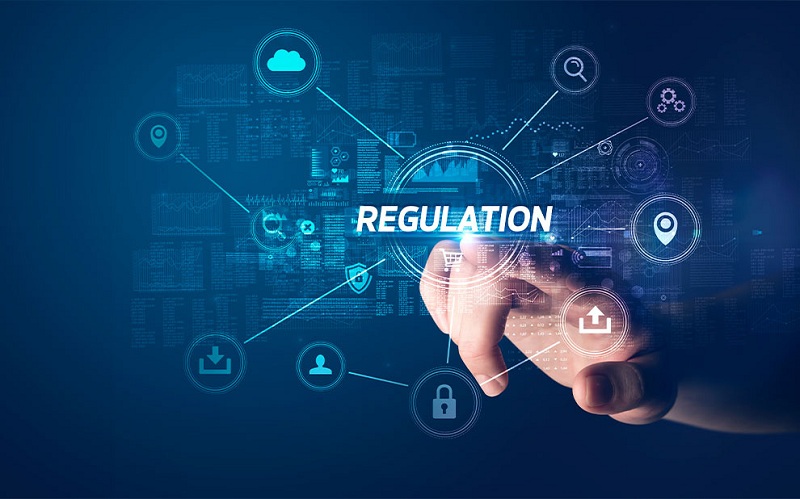Potential benefits of regulating digital platforms are often a hot debate topic. Many say these rules are a modern must. I’m here to give you the real scoop on how they can protect you and keep online players fair. Imagine the web safe and your data locked tight. I know that’s what you want, and good rules might get us there. Imagine too, all tech firms having a fair shot without the big guys pushing them around. And get this, with the right touch, we might even see cooler, new tech and trust the systems more. But without rules, bad info and sneaky A.I. could mess things up. Let’s dive deep into why tough laws for the digital space could be a game-changer for you and me.
Enhancing Consumer Protection and Data Privacy in the Digital Realm
The Role of Regulation in Improving Consumer Protection Online
Big tech firms hold lots of power. They store heaps of our personal info. This can be scary. New rules help keep them in line. These rules aim to protect you. They stop tech giants from misusing your data. This means when you surf the web, you’re safer.
Picture this: you buy shoes online. Behind the scenes, your info gets shared a lot. Without rules, companies can use this info in ways you might not like. But good rules make sure they treat your data with care. This helps stop sneaky ads that follow you around. It also cuts down on unwanted emails filling your inbox.
One main goal is to stop bad stuff before it happens. Think of it like a game of soccer. In soccer, we have rules to make the game fair. Online, we need rules to make sure everyone plays nice. This keeps you safe and lets you have fun online without worry.
Advancing Data Privacy Standards through Greater Oversight
Now, let’s chat about your right to keep things private. Have you heard of GDPR? It’s a set of tough rules in Europe that guards your private details. These rules tell companies how they can handle your info. They also let you ask companies what they know about you. You can even tell them to delete your stuff if you want.
Here’s a good thing to know. When one place sets strong privacy rules, it can inspire others. It can lead to improvements around the world. More than that, it can stop companies from being too nosy. Think of it like setting up a better fence around your home. It keeps out folks you don’t want snooping around.
A huge plus is that good data rules help small businesses too. They level the playing field. Small shops can compete better with big tech firms. They can win your trust easier. This is super important for a healthy digital world.
In short, we need these rules to stay safe online. They help make sure companies don’t misuse our info. And they keep the internet a place where we can all play fair. It’s a big deal, and it’s all about looking out for you.

Fostering Competitive and Fair Digital Marketplaces
Tackling Market Dominance: The Case for Curbing Monopoly Power
Big tech can get too big. They can push out smaller guys and call all the shots. Regulating these tech giants means we make sure the game is fair for everyone. Regulated, they can’t just do as they please. Smaller businesses get a shot, and prices stay fair for us all. Think of it like sports; no player should have an unfair edge.
That’s where rules come in. We create them to curb the huge power these companies hold. Antitrust laws for tech companies are not new. Yet, we need to adjust them for today’s digital world. By doing so, we help everyone get a fair chance to thrive in the market.
Rules bring out the best in tech giants. They push them to be better. To innovate. To think of you and me before making a move. Not just their big profits. These checks make sure no one company takes over the whole market. It keeps them honest and on their toes, helping the smaller guys compete.
Encouraging Fair Competition and Platform Neutrality
Now let’s talk fair play. Imagine a digital market. Here, every player shakes hands with the rest and plays by the rules. Fair competition is just that. It’s a level playing field.
Regulating online platforms is key to this. We need to make sure they treat all users the same. No secret tricks. No playing favorites. Think of it like having refs at a basketball game. They make sure all players follow the game rules.
By enforcing platform neutrality, we can trust the system more. It gives new ideas a shot. It helps smaller businesses. It also means better prices and more options for us. When platforms don’t pick sides, the best idea can win.
Fair competition also keeps innovation alive. When there’s a fair race, everyone runs faster. They try harder. They come up with new ways to win. That’s the sweet spot. That’s where great new things get made.
So, regulating this digital game isn’t about messing with tech. It’s about keeping things square. It’s for the small business trying to reach for the stars. It’s for you and me, so we get the best deal. And it’s for the future, to make sure new ideas keep coming. It’s for a digital world we can all trust and grow with.

Cultivating Innovation and Ensuring Platform Accountability
Driving Innovation in a Regulated Digital Environment
When we talk about advancements in tech, we often think regulation slows things down. But, let’s take a closer look at how setting the rules can actually rev up innovation. Picture a race track: with no guardrails or rules, cars could crash or take dangerous shortcuts. Now imagine those guardrails as smart tech regulations. They guide tech giants to speed ahead in the safest way, for everyone’s win.
The advantages of regulating tech giants are clear. It means a tech company must play fair and think big. They must think beyond profit. They must think about how to make things that help all of us. This can spur even more great ideas.
Regulation can bring out the best in bright minds. Without tight corners of tight rules, inventors know the play area. They can dream and build within it, aiming to top others in a fair digital services act. This helps small businesses too. With a level field, they can share big ideas that could change the game.
By encouraging fair competition, rules keep one player from owning the whole field. That means more choice for you and me. It helps to curb market dominance that can shut out new players.
Promoting Transparency and Accountability in Algorithmic Decision-Making
Picture this: you want to know how a magic trick works. With tech, this ‘magic’ is often algorithms, the secret code that decides what you see online. When we check these codes, we get transparency in algorithms. We make sure the magic trick is fair for everyone watching. It’s like showing there are no hidden cards up a magician’s sleeve.
Regulation can make sure that the tech we use every day is like an open book. With clear rules, tech companies must show us how their systems decide what news or ads we see. This is key in combatting misinformation online. Knowing how the trick works can stop false stories from spreading.
Rules also mean tech giants must explain how they use our data. This consumer protection online is like teaching us to lock our digital doors to keep our info safe.
When platforms follow clear rules, they show they can be trusted. This builds strong consumer trust in digital platforms. It’s proof they care about doing right by us.
And what about ensuring online safety? With proper rules, we can stop bad actors before they do harm. These digital guards work 24/7 to mitigate cyber risks.
Now, data privacy improvements might sound complex, but it’s really about guarding secrets. It’s making sure our private chats stay just that – private.
To wrap it up, think of a digital world much like a big city. Rules and laws keep it running smooth. Guardrails keep things in line. They make sure everyone gets where they’re going, fast and safe. And most importantly, they make sure everyone has a chance to be part of this great ride. Regulation doesn’t mean putting the brakes on innovation. It means making sure that as we soar into the digital future, we do so with seatbelts on, ensuring everyone arrives safely and has a fair chance to enjoy the journey.

Reinforcing the Integrity of the Digital Economy
Mitigating Misinformation and Cyber Risks Online
We all see it—misleading stories and scams online. But think about it. What if rules could keep our digital world honest and safer? That’s a key benefit of setting up stronger rules for online platforms. Cutting down on lies and online threats makes the internet a place we can trust.
By pushing for better control over digital content, these rules fight fake news. They help ensure that the news and tips we get are honest. Now, this isn’t simple. It means that people who run websites must check facts and remove lies. But here’s the thing: it protects us, our choices, and even our democracy.
Online safety is another big win. With rules, we can stop hackers and protect our secrets. Our emails, photos, and personal stories stay safe from those who might misuse them. We all deserve a digital life that’s not just easy but also safe. Tech regulation can give us just that.
Enforcing Ethical Standards for the Use of Artificial Intelligence
Let’s talk about smart machines—artificial intelligence, or AI. It’s cool when a computer can suggest a new song or remind you of a friend’s birthday. But, they must learn to play fair. This is where rules come in.
For one, they can make sure AI treats everyone the same, no matter who they are. This means no unfair advantages or biases. It’s all about playing by the rules, for everyone’s sake. Also, think about jobs. We want AI to help, not take our jobs. Rules can make sure AI supports workers, not replaces them.
Another point is about how AI makes choices. There must be clear reasons for why an AI system says “yes” to some things and “no” to others. This way, if AI suggests you buy something or rejects your loan application, you’ll know why. Transparency in how AI works gives us power and peace of mind.
Regulating digital giants has loads of advantages. It keeps our cyber world honest, fair, and safe. It makes sure AI plays nice, now and in the future. Remember, these rules aren’t just for big-shot companies. They protect us, our families, and our communities online. And when we’re all better off for it, that’s a win in my book.
In this post, we’ve tackled big ideas about making the digital world safer and more fair. We covered how rules can guard us online and push for better privacy. It’s clear we need to watch tech giants more closely to keep markets even and open. We need solid laws to keep the playing field level for all.
We also dived into how smart rules don’t choke out new ideas but make sure tech plays by the rules. Making sure companies show how they use algorithms is key for trust. And we can’t ignore how vital it is to fight fake news and the misuse of AI. It’s all about keeping the digital world honest and making sure it’s a place where good ideas win and people are safe.
It’s big stuff, but we’re all in it together. By simply knowing these issues, we’re on a better path. Let’s keep talking about it and push for a digital space that’s fair for everyone.
Q&A :
What are the main advantages of regulating digital platforms?
Regulating digital platforms can present several potential benefits. These include promoting fair competition by preventing monopolistic practices, protecting user data privacy through stringent data governance, and ensuring content accountability to limit the spread of misinformation. Moreover, regulation can enhance consumer protection, providing users with more confidence in the digital services they use.
How could regulation impact innovation in the digital space?
While some argue that regulation might stifle innovation, others believe that it can actually foster it by creating a level playing field. Through regulation, new and smaller players may have a better chance to compete with established tech giants, potentially leading to more innovative solutions and services in the digital ecosystem.
Can regulation of digital platforms improve user privacy and data security?
Yes, one of the key objectives of regulating digital platforms is to safeguard user privacy and enhance data security. Regulations such as the GDPR in the EU have been implemented with the aim of giving individuals control over their personal information, thus requiring platforms to adhere to strict data protection standards, consent mechanisms, and transparency.
How does regulating digital platforms protect against misuse and abuse?
Regulation can address various forms of misuse and abuse on digital platforms, including cyberbullying, hate speech, and the spread of illegal content. By establishing clear guidelines and holding platforms accountable for the content they host, regulators can compel these platforms to implement more robust content moderation systems and take a proactive stance against harmful activities.
What role do government and policymakers play in the regulation of digital platforms?
Government bodies and policymakers are crucial in the process of regulating digital platforms as they are responsible for crafting the laws and regulations that determine how platforms operate within their jurisdictions. They must balance the interests of consumers, businesses, and the platforms themselves to create regulations that promote a healthy digital environment while fostering innovation and growth.



